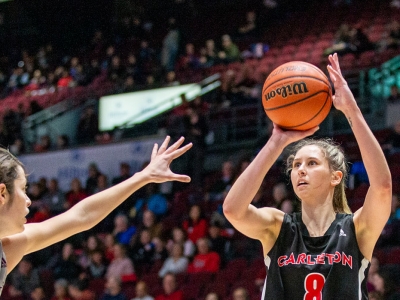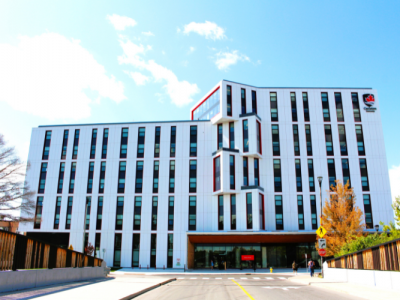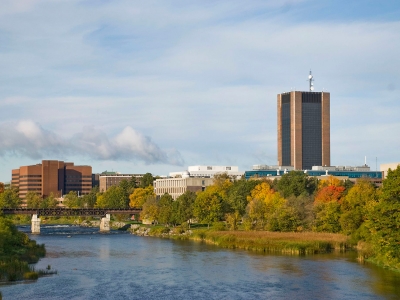As Canadians and their governments continue to deal with the COVID-19 outbreak, Carleton experts are available to discuss related topics.
Louis-Philippe Beland
Professor, Department of Economics
Email: louisphilippe.beland@carleton.ca
Note: Beland is comfortable speaking French
Beland is happy to discuss labour market issues and government policies related to COVID-19. His expertise covers public economics, labour economics and education.
David Coletto
Professor, Political Management
Email: David.Coletto@Carleton.ca
Coletto leads Abacus Data’s team of research consultants and strategists, delivering strategic advice and research design expertise to some of Canada’s leading corporations, advocacy groups and political leaders.
He is available to discuss public opinion and attitudes, changing consumer behaviour, changes COVID may bring and what the new normal may look like.
Robert Coplan
Professor, Department of Psychology
Email: Robert.Coplan@carleton.ca
Coplan’s research is in the areas of children’s socio-emotional functioning and developmental psychopathology. In particular, he is interested in the development of shyness, social withdrawal and social anxiety in childhood. His most recent research projects have focused on the costs and benefits of solitude in childhood, the challenges faced by shy and anxious children at school, and the meaning and implications of shyness and social withdrawal across different cultures.
Jim Davies
Professor, Institute of Cognitive Science and School of Computer Science
Email: Jim.Davies@carleton.ca
Davies is available to discuss how Buddhism and mindfulness can help people deal with measures to protect against COVID-19, including not touching one’s face. He is also available to discuss anxiety, depression, fear, prejudice and feelings of isolation during the pandemic.
As director of the Science of Imagination Laboratory, Davies explores computational modelling and artificial intelligence applied to human visual imagination. His work has shown how people use visual thinking to solve problems and how they visualize imagined situations and worlds. He is a frequent contributor to Nautilus magazine and is author of Riveted: The Science of How Jokes Make Us Laugh, Movies Make Us Cry, and Religion Makes Us Feel One with the Universe. He is co-host of the award-winning Minding the Brain podcast.
Jeff Donaldson
PhD Candidate, School of Public Policy and Administration
Email: Jeff.Donaldson@carleton.ca
Donaldson is available to discuss individual and household emergency preparedness, government messaging, the theory of panic buying, as well as the world of those who identify as preppers or survivalists.
Donaldson’s research has focused on how prepared Canadians are for emergencies and why the message of preparedness has not been adopted. Specifically, he analyzes the relationship between municipal governments and community organizations with a view to discover a better way to leverage social capital and create a more resilient population.
Linda Duxbury
Professor of Management, Sprott School of Business
Email: linda.duxbury@carleton.ca
Duxbury is available to discuss Issues relating to work-life balance, the need to shut the technology off and keep regular hours.
Julie Garlen
Professor, Co-Director, Childhood and Youth Studies and Acting Co-Director, Human Rights and Social Justice
Email: juliegarlen@cunet.carleton.ca
Garlen is available to discuss the impact of the pandemic on children, primary education, children’s rights and social constructs of childhood (particularly childhood innocence), as well as the connections to children’s popular culture and digital/social media literacy in a global health crisis.
Garlen previously worked in early childhood teacher education in the United States for 11 years. She explores how culture functions symbolically, institutionally and pedagogically in the lives of children and youth.
Josh Greenberg
Professor, School of Journalism and Communication
Email: Joshua.Greenberg@carleton.ca
Greenberg is available to discuss crisis and risk communication, as well as media coverage of COVID-19.
His research examines media coverage of outbreaks and infectious disease risks; public risk perceptions of vaccination; the risk communication activities and strategies of key public health agencies and organizations; and the impact of technology change on public health communication.
Kim Hellemans
Instructor, Department Chair, Department of Neuroscience
Email: Kim.Hellemans@carleton.ca
Hellemans is available to discuss the impact of social isolation on mental health and stress during the COVID-19 outbreak.
Hellemans’s research interest lies in the study of vulnerability to mental illness. Her past research explored the role of adverse environmental experience in susceptibility to drug addiction. Her current research examines how prenatal exposure to alcohol influences later life susceptibility to mental illness. Hellemans’s other main research interest is sex differences in mental illnesses; depression is twice as common among women. She is a co-host of the Minding the Brain podcast.
Mohamed Ibnkahla
Professor, Department of Systems and Computer Engineering
Email: Mohamed.Ibnkahla@carleton.ca
Ibnkahla is available to discuss the potential role of artificial intelligence in the fight against COVID-19.
Ibnkahla is the NSERC/Cisco Senior Industrial Research Chair in Sensor Networks for IoT. His research interests include wireless sensor networks, IoT, cognitive radio networks, adaptive signal processing, reconfigurable networks, sensor integration and radio frequency identification (RFID) systems.
Hashmat Khan
Professor, Department of Economics
Email: hashmat.khan@carleton.ca
Khan is developing new research to better understand and quantify the effects of isolation measures on containing the COVID-19 pandemic. A brief writeup about his recent project is here: https://carleton.ca/fpa/2020/economics-researcher-finds-spanish-isolation-policy-reduces-covid-19-deaths-by-95/.
As an economist, he is also interested economic policies that can help mitigate the extreme effects of the health crisis.
Ian Lee
Professor, Sprott School of Business
Email: Ian.Lee@carleton.ca
Lee is available to discuss the economic impact of COVID-19.
Lee has appeared multiple times before the House of Commons and Senate finance, banking, industry and trade committees. He has been in every Government of Canada budget lockup since 2008. He attended pre-budget consultations with the Minister of Finance in 2009 and 2011. His work has appeared in the annual publication How Ottawa Spends concerning Canada’s retirement system, the Parliamentary Budget Officer, deficits, corporate income reform and the Liberal downsizing of 1995-97 and the Conservative Government downsizing of 2010-15.
Marina Milyavskaya
Professor, Department of Psychology
Email: marina.milyavskaya@carleton.ca
Milyavskaya is available to discuss habits, goal setting and mental health/stress during COVID-19.
Milyavskaya’s research examines the pursuit of goals and looks at contextual and individual factors that promote successful goal pursuit and attainment as well as the self-regulatory mechanism implicated in this process.
Scott Mitchell
PhD Candidate and Instructor, School of Journalism and Communication
Email: Scott.dobson.mitchell@gmail.com
Mitchell is available to discuss risk perception and behaviour, as well as crisis communication.
In addition to his research, Mitchell is a knowledge broker with the Canadian Centre on Substance Use and Addiction.
Rodney Nelson
Instructor, Sprott School of Business
Email: Rodney.Nelson@carleton.ca
Rodney is available to discuss the impacts of pandemics on businesses and overall pandemic preparedness.
Rodney was the chair of the Canadian Pandemic Preparedness Working Group, and a member of the Minister of Health’s Canadian Pandemic Preparedness Team. He represented Canada to the Asia Pacific Economic Cooperation (APEC) on pandemics and has given several talks on pandemic preparedness in Canada and internationally.
Banu Örmeci
Jarislowsky Chair in Water and Global Health, Canada Research Professor in Wastewater Treatment Engineering, and the Director of the Global Water Institute at Carleton.
Email: banu_ormeci@carleton.ca
Örmeci can discuss water, sanitation and waste management issues during the COVID-19 virus.
Patrick Saunders-Hastings
Instructor, Health Sciences
Email: Patrick.SaundersHastings@Carleton.ca
Saunders-Hastings is an epidemiologist and risk scientist with expertise in global health, infectious disease epidemiology and emergency preparedness. His research has assessed the preparedness of the Canadian hospital system to accommodate surge in patient demand associated with future pandemics, and involved the development and application of a mathematical model to chart flu transmission in Canada.
His current projects include the implementation and use of digital health record systems and the assessment of drug safety and effectiveness. He is available to discuss epidemiology and the current state/projections, testing procedures, hospital capacity, contact tracing, social/physical distancing and return to work.
Noah Schwartz
PhD Candidate, Department of Political Science
Email: noahschwartz@cmail.carleton.ca
Schwartz is open to discussing the boom in gun sales in Canada and the United States resulting from COVID-19.
His research looks at the politics of memory and the use of narrative in the American gun debate. His doctoral research project studies community building and the mobilization of narratives about America’s past by the gun-rights movement.
Elliot Tepper
Distinguished Senior Fellow, Norman Paterson School of International Affairs, and Senior Research Fellow, Centre for Security and Defence Studies
Phone: 613-225-8076 or 613-852-4262
Email: E_tepper@carleton.ca
Tepper is available to discuss the political dimensions of the pandemic.
Tepper has worked with national and international organizations on a broad range of topics and has been engaged with media throughout his career. He can offer commentary on international relations, nuclear issues, the United Nations and terrorism.
André Turcotte
Professor, Political Management and the School of Journalism and Communications
Email: andre.turcotte@carleton.ca
Turcotte lectures in advanced quantitative communication research, political communication theory and political management. He posses a high level of expertise in quantitative analysis and would be available to discuss the political dimension of the pandemic: leaders’ performance, the confusing political messaging, and the need to understand the state of public opinion.
Note: Turcotte is fluently bilingual in French and English.
Gabriel Wainer
Professor, Systems and Computing Engineering
Phone: 613-520-2600 x 1957
Email: Gabriel.Wainer@sce.carleton.ca
Wainer has recently written in the Conversation about the role of computer simulations in predicting the spread on future pandemics. He is the head of the Advanced Real-Time Simulation lab, located at Carleton’s Centre for advanced Simulation and Visualization (V-Sim).
Leah West
Lecturer on International Affairs, Norman Paterson School of International Affairs
Email: Leah.West3@carleton.ca
West is available to discuss Canadian emergency laws and powers.
West has expertise in national security law, counter terrorism and cyber operations. She has served as counsel with the Department of Justice in the National Security Litigation and Advisory Group, where she appeared before the Federal Court in designated proceedings and the Security Intelligence Review Committee. West served in the Canadian Armed Forces for 10 years as an Armoured Officer – deploying to Afghanistan in 2010. She is a founding editor of the Intrepid Blog.
John Zelenski
Professor, Department of Psychology and Director of the Carleton Happiness Lab
Email: john.zelenski@carleton.ca
His research focuses on emotions, especially individual differences in emotional experience, and the role emotions play in modulating cognition. The topic of happiness unifies his research. He asks the question, who is happy? What are the personality characteristics that predict the experience of many positive emotions and few negative emotions? How do happy people think and behave differently than unhappy people?
Much of this work focuses on extraversion, positive emotions, and social behaviour. Another line of research investigates differences in people’s sense of connection to nature and links this to happiness and environmentally responsible behaviours.
Media Contact
Steven Reid
Media Relations Officer
Carleton University
613-265-6613
Steven.Reid3@carleton.ca
Follow us on Twitter: www.twitter.com/Cunewsroom
COVID 19 Updates: https://newsroom.carleton.ca/coronavirus-covid-19/messages/
Wednesday, March 18, 2020 in Experts Available
Share: Twitter, Facebook



